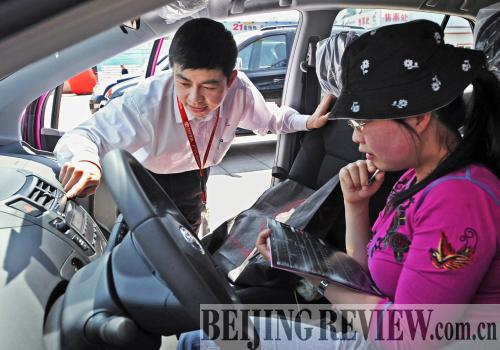|
 |
|
BUYING CRAZE: A salesman introduces an automobile to a customer in Hangzhou, the capital city of Zhejiang Province (TAN JIN) |
At age 30, and even with a six-figure annual salary, Ma Zhiqiang, a sales manager of a foreign-funded food company in Beijing, is still struggling to make ends meet.
Ma started at an entry-level job with a minimum wage at the company and advanced quickly up the ladder. Life was easy and sound until two years ago when he bought a downtown apartment at a peak price, which brought a cozy home for his wife and four-year-old son, as well as a pile of mortgage debt. On top of that, Ma's son is enrolled in a kindergarten that charges more than 3,000 yuan ($439) per month.
Since then, fancy suits, pricey cocktails and tennis clubs have become past memories. To earn a higher bonus, he even turned down the opportunity to take a vacation this year. His wife, a freelance Japanese translator, has also made sacrifices, parting ways with spending as much as 2,000 yuan ($293) a month on upscale cosmetics by purchasing less fancy store brands.
"Every time when I have the impulse to buy anything expensive, I will ask myself: do I really need this?" said Ma.
Living on a tight budget has been difficult, Ma said. Aside from mortgage payments, he and his wife have already begun putting money aside for their retirement, as both are uncertain of what may happen 30 years from now.
By cutting corners where possible, the couple tried to tide over the difficult times. But Ma believes it is worth the effort given how generous the reward has been. "Owning a home has given my family an anchor to cling on to so that we did not have to move from one rental house to another," he said. "Paying down a mortgage is also a form of forced saving, which should help us with retirement."
"In addition, we do not want to spend lavishly to set a bad example for our child," he added. Like the majority of the Chinese people, Ma believes thrift is a good virtue that should be carried on for generations.
Avid spenders
While the culture of saving still takes hold in China, a luxury-buying binge is roaring throughout the country as torrid economic growth has kept its millionaire-making-machine well oiled. Sales of everything from high-end watches to private jets are soaring and the financially distressed foreign luxury companies are increasingly tapping into the country to strike a profit amid the economic downturn.
A recent Goldman Sachs Group report ranks China as the world's second largest luxury-goods market. Japan holds the top spot. China will account for an estimated 29 percent of all luxury-goods sales by 2015, the report stated.
A pillar force of the luxury boom has been the young fashion-sensitive consumer base. They may not necessarily be rich but are ready to spend a month's salary on a fabulous handbag or new pair of shoes. By establishing their own styles, they want to look different and are always willing to pay the price in order to stand out or look unique. More importantly, many youths are the only child in their families, and are pampered with decent jobs and 100 percent disposable incomes as their parents pay for almost everything including apartments and health care.
Huang Xiaonian, a 23-year-old who lives in Nanning, the capital city of Guangxi Zhuang Autonomous Region, is like many who spend rampantly on dazzling luxury products.
Earning around 5,000 yuan ($731.5) a month as an administrative assistant with a local electronics company has ensured Huang an easy life in Nanning, where living expenses are much lower than Beijing and Shanghai. Since her parents have paid for a new apartment and a parking space, Huang has been left free of any major financial obligations.
Huang said she had saved little and spent almost all her monthly salary on stylish clothes, shoes and expensive make-up. In extreme cases, she even paid more than 8,000 yuan ($1,170) for a necklace and 10,000 yuan ($1,463) for a set of Dior cosmetics. Her boyfriend, a pilot with China Southern Airlines, also bought her luxury items at relatively lower prices from Hong Kong during his stay in the tax-free city.
"Every month when I pay my credit card bill, I would be surprised at how much I had spent," she said.
Although she admits that sometimes she feels guilty for her spending habits, when she sees something she likes, "I still cannot help buying it, especially if there is a discount," she said.
Huang said she is saving for a diamond ring worth around 100,000 yuan ($14,631), but added that she will try to be more frugal when she gets married.
In spite of her liberal spending habits, Huang knows that she should have saved more.
"You have to be more responsible for your family," she added. "I know education and providing for a child cost big money."
Since it takes time to build a comprehensive social safety net, policymakers have been tempting consumers with tax breaks and cash subsidies in an effort to boost consumption. While the measures are a stride in the right direction, they are far from a guarantee for a sustained shopping spree, said professor Guo. | 